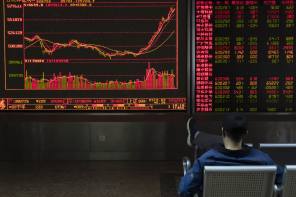

Data from Thomson Reuters Lipper revealed that European equity funds, including the UK, had suffered outflows amounting to £6.4bn between June and February, causing the sector to plunge to the bottom of the fund flow table.
US equity funds followed close behind after outflows amounted to £6.2bn over the same period, while those investment vehicles invested in British company shares saw outflows of £4.1bn.
The data, which looked at funds registered for sale in the UK, revealed that equity funds have had the most difficult time in terms of outflows, as investors were wary of the turmoil which has haunted the markets since the EU referendum and Donald Trump’s presidential win in the US.
Eight out of the bottom 10 sectors for outflows are in equity classifications, with European corporate bonds and UK real estate funds making up the other two.
Jake Moeller, who heads up the UK and Ireland research team at Thomson Reuters, said there has been a marked shift away from risky assets since the Brexit vote, with net flows showing investors have moved away from equities into short-term money market funds.
However, he said it was difficult to only attribute these flows to a “Brexit effect”, saying for example, that outflows from European equities could have also been driven by other European geopolitical issues.
“Furthermore, there has been a spike in volatility around the US presidential elections which will have undoubtedly spooked investors globally.”
Despite featuring on the outflows list, the UK real estate sector has seen a distinct turnaround in demand with the sector seeing outflows slow dramatically over the past nine months.
Figures from Thomson Reuters showed the UK property sector suffered outflows of £713m in June followed by £289m in July, but quickly recovered in August with outflows of just £47m.
Between November and February the sector’s monthly outflows never veered above £88m, aligning with research from Cerulli Associates which revealed demand into property funds had made a swift recovery.
These findings come during a difficult period for UK property vehicles, after a number of large funds were forced to suspend trading when thousands of investors looked to cash-in their investments.
Mr Moeller said: “We know that UK commercial property funds which have seen net outflows of some £1.5bn have been as a direct result of Brexit, but these outflows have now at least steadied with most of the fund suspensions now lifted.”
Meanwhile, looking at the league table for inflows, UK investors poured into money market funds, while short duration and global high yield bond funds also featured high on the list, after both sectors enjoyed inflows of nearly £5bn over the past nine months.
Despite the surge of outflows from European equity funds, Christoph Riniker, head of equity strategy research at private banking group Julius Baer, pointed out that Eurozone equities started to outperform the US market towards the middle of last year.
While the US has been a long-term outperformer, he said the market it is now confronted with what he described as a “tiring trend”.
By comparison, the eurozone is starting to pick up from very low levels, which Mr Riniker expects to continue following what he anticipates will be a “benign” outcome to the French presidential elections.
This also coincides with research from TD Direct Investing which found that 65 per cent of the investors 329 polled believe Europe has been wounded by the rise of populist movement.
Despite this, the survey revealed that investors were split about whether the triggering of Article 50 tomorrow (29 March) will have a positive impact on their portfolios.
Michelle McGrade, chief investment officer of TD Direct Investing, pointed to the improving confidence from European companies and consumers, adding: “The cyclical recovery across Europe is showing signs of gaining momentum.
“For European equities, the strengthening economic backdrop is improving earnings prospects,” she said, expecting earnings growth to surge this year with further improvement in 2018.
katherine.denham@ft.com



